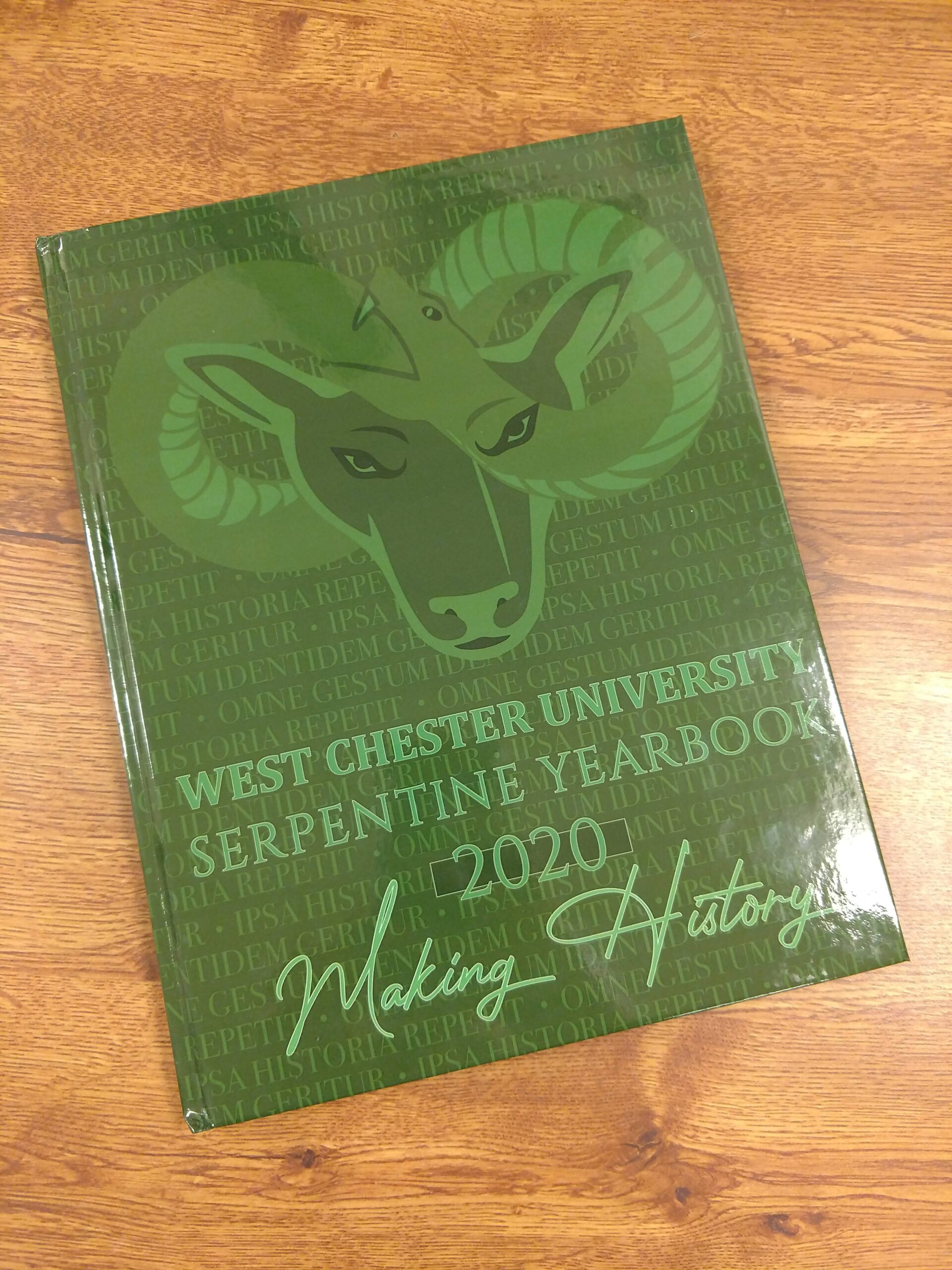Photos: Graphic created by Julien Padillo. “Serpentine 2020” taken by Maria Marabito
This year, the physical school campus has extensively transformed into an all-encompassing digital landscape. There are no in-person classes to attend, campus organization meetings to join or sports matches to cheer at; there is no library to study in or Rammy statue to pass on the way to class. In this Zoom-meeting-oriented time, the student body is disconnected — further than the standard six feet apart. That is why the story behind this year’s edition of The Serpentine yearbook is a compelling one, for a yearbook embraces the journey of the student body as a whole, from start to finish. This fall, The Quad got the chance to speak with Serpentine Editor-in-Chief, Lionel McCulloch.
Why is the yearbook important? When asked this question Lionel McCulloch expressed that this topic crossed his mind a lot in the past year, in which he had been thrust into the Editor-in-Chief role mid-pandemic. He described that a struggle lied in figuring out what the yearbook needed to become during a time in which we are knee-deep in big, historical moments.
“A strong yearbook in any year is the collective memory of a community of students and a school’s traditions documented — hopefully with great photos that tell strong stories — combined with well-calculated text that wraps things into quick looks back in words. There are so many things that happen to the individuals that we can’t always capture, but the truth is that a yearbook is what we will all look back on to remember what happened as a community,” McCulloch said.
As COVID-19 really began to hit the WCU community, McCulloch did his best to obtain photos of all that would not be there in the coming semesters. Alongside the typical year-to-year documentation of WCU traditions of debates, homecoming and Banana Day, he gathered together photos of social distancing signs and reminders, masks and the empty shelves that haunt a plethora of stores. “A yearbook is important because it is the historical document of our shared memory,” said McCulloch. “As Editor-in-Chief of the Serpentine, the yearbook brings me the amazing feeling of writing tomorrow’s history book as well as creating a beautiful piece of art. I really care about the yearbook and want everyone else to have the experience of holding those memories forever.”
The Serpentine is one of West Chester University’s oldest clubs: students came together to create a record of West Chester school history. The first yearbook of the then-West Chester Normal School, titled The Pathfinder, was published in 1910; the following year, The Pathfinder was renamed to The Serpentine, which it has remained ever since.
McCulloch describes the yearbook as a place of “collected memory” shared by the community:
“Memory is not everything that happened — it is the best and worst parts of what happened that linger long after something has ended … Our WCU yearbook focuses on making sure that the senior class gets featured, but it also tries to share those highlights of a year that the whole campus will want to remember.”
The 2020 yearbook is said to feature the memories that all will hold onto. “…[A]nd I’m hoping in this weird year of 2021 where we are all trying to continue the traditions from home, that our community will share their memories with us so that we can put them in the next book,” expresses McCulloch.
Pushing out the yearbook in 2020 was said to be a “real burst of adrenaline.” McCulloch explained that he was originally supposed to be the sports section editor; however, due to circumstances beyond anyone’s control, March was met with only a handful of staff still working on Serpentine. Due to McCulloch’s past with editing books in high school, his higher level of experience left him, with a bit of help from others, to produce the yearbook largely on his own.
Production of the book was quite challenging, to say the least. McCulloch admits to having to email seniors on an individual basis to request photos and portraits due to the impact of COVID-19. There were some silver linings, however: “For 2020, most of the big events had already happened — so we actually were able to track down photos and had articles from The Quad and the PR office at West Chester to help guide us in what was essential for a yearbook.”
McCulloch says the original concept of Serpentine 2020 was to be a yearbook focused on the past books, as well as the evolution of West Chester students from then to now. The idea was soon disregarded when the pandemic emerged as a more important shared experience.
Now, the book boasts a “historic look” at West Chester University campus during the Pennsylvania COVID-19 lockdown. While Serpentine still retains the normally featured traditions, there is also a great focus on the documentation of COVID-19’s impact on West Chester.

“…[C]lasses coming from home, the BLM marches and demonstrations, the masks and the toilet paper shortages,” says McCulloch, illustrating Serpentine’s work. “Empty campus photos were picked to really show how our usually busy school was completely devoid of people. And with graduates doing their ‘march’ at home — we reached out and tried to get photos from as many seniors as we could.”
McCulloch expressed great gratitude towards those who helped contribute. “I want to give a special shout out to the photographers who shared their work with us: the PR department at WCU, especially Erica Thompon, James Zuhlke and the photographers in the Athletics Department, and to alumni Shaye Whiteman who sent us so many great senior moments when graduation didn’t end up happening. Also, thank goodness for all the parents who reached out and shared even one photo of their own graduations.”
Serpentine 2021 is proving to be an even steeper uphill battle. “We are already seven weeks in [at the time of this interview], and we don’t have that many photos yet. I think the biggest challenge we are having is knowing when events are happening (if they are happening) ahead of time and making sure that someone is there taking pictures,” says McCulloch. As most of the Serpentine staff is off-campus, this “someone” does not necessarily refer to the yearbook staff themselves. The overall goal of Serpentine is to gather photos — amidst and in light of COVID-19 restrictions — to be part of the previously mentioned “collective memory.”
“The memories in our book are going to have to be the memories students, staff and teachers physically share with us in photos,” McCulloch explains. “Photos make the memories come to life. So we’re struggling with how to get every student, especially seniors, to send us at least one strong photograph that really speaks to traditions or events or experiences.” The 2021 book is expected to be a contrast to all that he has done before and different from all that WCU has witnessed since the early yearbooks — the ones that saw more writing at the time, rather than photos.
McCulloch emphasizes the need for photos and other involvement as COVID continues to provide challenges in creating the 2021 yearbook. “This year where we don’t have live sports or live theater and concerts or all of the parties and the bonding events — we really think this book can BE the bonding experience of the school — if every single student, faculty member and staff member helps,” states McCulloch. “Eventually, things will move back to much like our old normal — but this book is going to be the historic record of time unlike any other.”
Serpentine 2020 is currently available in the campus bookstore and is on sale until copies run out.
For more information on how to submit photos for Serpentine 2021; senior portraits; ordering shoutouts, group highlights or ads; ordering the 2021 yearbook or generally getting involved with Serpentine: refer to the accompanying flyer, visit Serpentine on RamConnect or reach out to serpentine@wcupa.edu
Julien Padillo is a third-year Media & Culture major. JP913571@wcupa.edu

